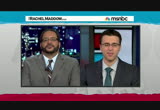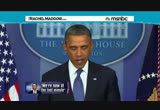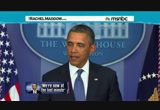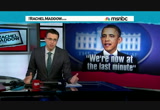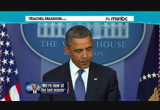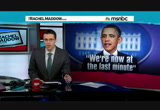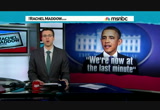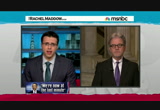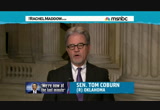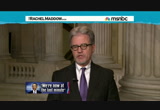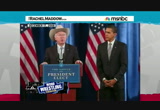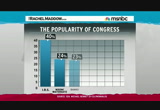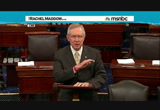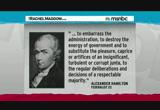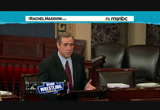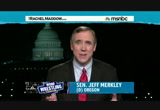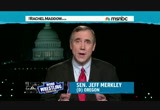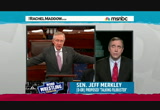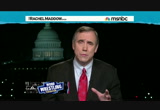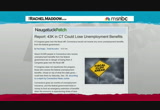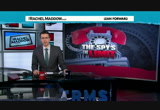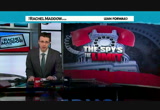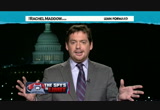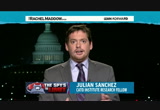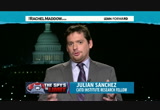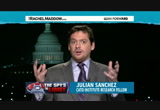tv The Rachel Maddow Show MSNBC December 29, 2012 1:00am-2:00am PST
1:00 am
of their own, as you suggest, have fallen out of the economic system, for a period of their life. it does not have to be their whole life. >> right. >> but if you cut the benefits, it could be their whole life. >> 30 seconds, how optimistic are you that something will get done to help the unemployed? >> i know that president obama takes this very, very seriously, and i know that barbara lee and a number of the members of the house have been really pushing this, as it's something not to be forgotten in the fiscal cliff fight. i put my faith in them to continue to raise this flag and to say, we cannot let congress leave washington without taking care of these folks. >> john nichols, as always, thank you so very much, my friend. that's it for the ed show. ezra klein is filling in for rachel tonight. always good to see you, my friend. >> good to see you too, and happy friday. and thanks to you at home for sticking around for the next hour. rachel's got the night off, but we learned something huge today. we are going over the fiscal cliff. we are going either all the way over or going partly over, but
1:01 am
we are definitely, definitely going over. that whole fiscal cliff thing, where congress and the white house can't reach a deal on taxes and spending before the end of the year and they maybe get us into a recession, it's definitely happening. that was the whole point of president obama's press conference this afternoon. >> i still want to get this done. it's the right thing to do for our families, for our businesses, and for our entire economy. but the hour for immediate action is here. it is now. >> allow me a quick update here. that press conference, it came after president obama met with john boehner and nancy pelosi and harry reid and mitch mcconnell, so all the key congressional leaders. and listen to the president here. >> the american people are watching what we do here. obviously, their patience is already thin. this is deja vu all over again. america wonders why it is that in this town for some reason, you can't get stuff done in an organized timetable.
1:02 am
why everything always has to wait until the last minute. well, we're now at the last minute. and the american people are not going to have any patience for a politically self-inflicted wound to our economy. not right now. i just have to repeat. you know, outside of washington, nobody understands how it is that this seems to be a repeat pattern, over and over again. ordinary folks, they do their jobs. they meet deadlines. they sit down and they discuss things and things happen. if there are disagreements, they sort through the disagreements. the notion that our elected leadership can't do the same thing is mind boggling to them. and needs to stop. >> i just have to repeat, congress, you are terrible at your jobs. i really don't like working with you.
1:03 am
we're going to talk a bit later in the show about everybody hates congress and what we can do about that. but as much as the public hates congress, you really get the feeling that congress' approval rating among president obama is in the neighborhood of negative 75,000 percent. and yes, numbers geeks, not a real number. but he seems really tired of working with these people. but there is a way in which congress, and particularly congressional republicans may actually be helping president obama out right now. everybody's always known two things about the cliff. you're almost certainly going to get more taxes in a deal after you go over than in a deal before you go over it. that's because after you go over the cliff, taxes already go up for everybody. so anything you do, any reasonable deal congress reaches, it will be a big tax cut. but the other thing about the fiscal cliff is you don't want to be blamed for going over it. it is going to be bad for the economy. it's bad for the country. what speaker boehner's done is create a situation in which we're going to go over the
1:04 am
fiscal cliff. but the people who want higher taxes, the democrats, they're not going to be blamed for it. after all, it was john boehner who walked away from negotiations to try plan "b" last week. then it was john boehner who planned to pass plan "b" that very same week. then it was mr. boehner who said it was up to the senate, someone else's problem. just from a pr perspective, what john boehner has done here is a debacle for the republicans. and the white house, they've just been sitting back the last week or so and letting it happen. but today, they gave us their plan going forward. you could call it deal and jam. >> i'm optimistic we may still be able to reach an agreement that could pass both houses in time. senators reid and mcconnell are working on such an agreement as we speak. but if an agreement isn't reached in time, between senator reid and senator mcconnell, than i will urge senator reid to bring to the floor a basic
1:05 am
package for an up or down vote, one that protects the middle class from an income tax hike, extends the vital lifeline of unemployment insurance to 2 million american looking for a job, and lays the groundwork for future cooperation on more economic growth and deficit reduction. you guys, i can hear you over there. i believe such a proposal could pass both houses with bipartisan majorities. as long as those leaders allow it, to actually come to a vote. if members of the house or the senate want to vote no, they can, but we should let everybody vote. >> i would actually really like to know who he was shushing there. but to his main point, here's what the president intends to do. senators reid and mcconnell will try to come to a deal. if they fail, the white house and harry reid are going to try to jam through a bill that increases taxes on rich people and extends unemployment insurance, which are the two key democratic priorities. they'll pretty much dare republicans to block it. and republicans probably won't
1:06 am
be able to, at least not for long. here's johnny isaacson, a republican senator from georgia, over the weekend. >> if we get down to the end of this year, and the only choice we have is to save taxes going up on the middle class, then i would support that. >> last weekend, "the wall street journal" had a great piece going behind the scenes on the fiscal cliff negotiations. and in it, they quoted this exchange between speaker boehner and president obama. mr. boehner said he wanted to deal along the lines what the two men had negotiated, summer of 2011, in the fight over raising the debt ceiling. "you missed your opportunity on that," the president told him. cold. but what we know right now, what we know from that is that john boehner wishes he could go back in time, get in the time machine, go back to 2011, and get the deal that president obama offered him then. mr. boehner wants another bite at that 2011 deal, because back then, the president was offering to stop at $800 billion in new taxes. my prediction here right now is that in a few weeks or a few months, republicans are going to wish they could go back to 2012,
1:07 am
right now, and get the deal president obama offered them a week ago, which only raised about $1.2 trillion in taxes. because here's what i think is going to happen now. if we get a small deal before we go over the fiscal cliff, either because harry reid and mitch mcconnell come to a deal in the senate, or because democrats jam the republicans in congress, it's mostly going to be about extending the bush tax cuts for the middle class, which will mean letting them expire for the rich. that will net somewhere around $600 billion in new tax revenue. the white house will pocket that. they will have got in three quarters of what they wanted last year, before even the negotiations had really kicked off. then we're going to go over the cliff and the pressure will mount quickly to strike another deal. republicans are still going to want entitlement cuts sop the white house will insist that the next deal include a dollar in tax increases for every dollar in spending cuts. so in that next deal, image republicans want $800 billion in spending cuts, a number of they've kicked around before. democrats will say they need that much in taxes, too. and because they've already raised rates, they got those middle class tax cuts extended,
1:08 am
and the rich ones expired, they'll be open to do hitting through tax reform, which will be easier for republicans to swallow. let's say they do get the one to one match. that will be an $800 billion tax increase for a $1.4 trillion revenue increase in total. so democrats could easily end up when all of this is said and done with more revenue than president obama was asking for a week ago. and it will happen if it happens, because over and over and over and over again, john boehner and the house republicans could not take yes for an answer. they had to say no to this president. so they kept delaying until they were weaker. they pushed negotiations from 2011 where they were very strong, until 2012, right after the president had won re-election, and now they're pushing to to 13, after the fiscal cliff hits and they get blamed. it is an odd way to negotiate. to get one republican view on what will come next year, early this evening, shortly after the president's press conference, i had the privilege to speaking to republican senator tom coburn of oklahoma.
1:09 am
senator, thank you so much for being here tonight. >> glad to be with you, ezra. >> it so seems to me the news of the day is the big deal is dead, completely dead, and we are down to either a small down, a mini deal, or going after the cliff straight. what is your reaction to this? >> i don't -- you know, i'm not sure that's true. just talking to my colleagues in the senate, i think the middle ground is pretty well known by everybody, and i think you could still get something that would be viewed by the ratings agencies as well as the american public as a pretty good solution. so i think it's possible. i don't know that that will happen. it's unfortunate that we're waiting until this late in the hour to try to accomplish something. >> so, then, what do you see as that middle ground? i know you're a member of the gang of eight. i've been surprised, actually, i've not seen more coming out of ad hoc groups of senators and congressmen. when you talk to your colleagues, what do they see as what can be salvaged here? >> well, let me answer the first part of that. none of us wanted to try to jeopardize what was going on, so
1:10 am
we did not intentionally interject, other than very little behind the scenes, in terms of saying we needed to get something done. as far as specifics, i don't know. there's a range that you could pass in terms of revenues. there's a range in which you can meet on medicare, that i think is solvable in terms of actually creating some savings in medicare that will secure it, that won't be harmful to seniors. so i think there's the potential for that. i think there's the potential to do some changing with the sequestration, in terms of how it's done, so that we don't eliminate good programs, and more of the cuts come from those that are not as well functioning or efficient or effective. so i think the mood among the colleagues on both sides of the aisle is, they'd like to see something get done.
1:11 am
and what that means is, whatever comes out that's in that middle ground, we're all going to have things that we don't like about it, but we're going to swallow, so that we can do what's best for the country. you know, the question that ought to be asked is how is it in this country that we would let ourselves get in this position, and where have the grown-ups been to make sure that it doesn't happen? and that's the disappointing things, because it's an abject failure of leadership, on everybody's part, that we're at this late date, and no compromise has been brokered. >> is there an expectation in that process that you're talking about would be separate from reid and mcconnell's ongoing negotiations? are people going to wait to see what they do before trying to come forward with something separate? >> no, i think they've heard well from their caucuses, and we've been talking across the aisle. i had visits with several of my democratic colleagues today. we all want to see something get done, and there's a range in there that everybody kind of knows where we can go. and what i would manage is that you'll see reid and mcconnell
1:12 am
come with something that's within that range. and the president has the to say, yeah, i can take this too. and then if we actually lead in the senate, we'll see what the house does with it. >> what i've had trouble understanding about the congressional republican strategy in recent weeks is that starting from plan "b," and going even into the reid/mcdonnell deal, or at least what i'm beginning to hear about it, is that there seems to be a plan now to vote on taxes separate from spending cuts, such that democrats would be able to hock it, some amount of taxes, which will be smaller than what president obama wanted, but will come separate from spending cuts, at least at the outset, and another set of negotiations after the new year, that will have spending cuts and taxes in it. it seems to me that that's a recipe for republicans to end up getting a lot more in taxes than they would have got in all with an up-front deal. are your colleagues worried about that at all, or are you? >> first of all, you're enlightening me on something i'm not aware of. that was not the conversation i had with my colleagues across the aisle and that wasn't the
1:13 am
conversation i had with the minority leader. so you have information that i don't have. look, you can't solve the problem with taxes. you have to do both. this country is in trouble, fiscally and financially as well as ratings. and if we don't do something significant, we'll see another rating cut. and there'll come a time when the interest costs, we cannot afford. so the question comes is, what is the best thing we can do now, given the political dynamics that are in washington that actually make some difference in the future, and when i say future, i'm talking about our kids and grandkids. what can we do that will actually get us back on the path? you know, one of the things that people don't look at, they compare our debt-to-gdp ratios, ezra, but when you actually make an equal comparison from us, to the countries of europe and around the world, we're actually at about 120% debt to gdp right now.
1:14 am
and of course, that's internal/external, but the external debt, we're over 100 now. so we're in much better shape than when we talk about the problems that we have. so i'm willing to do it incrementally, willing to do it all as a big time. what i'm willing to do is solve the problem for the future of our country. so if we do that, and the more we do of it, the more we'll see economic growth start coming. i think we're primed for economic growth, but we have to solve these very real issues to be able to take advantage of the prime. >> i agree with you. i think the economy can take off and washington can get out of the way at this point. tom coburn, republican senator from oklahoma, thank you very much for being here. >> ezra, good to be with you. god bless you. there is one way we can start to fix our dysfunctional congress, and guess what, they are actually thinking about doing it. which, of course, means now other congressmen are thinking about how to stop them from doing it. that is next.
1:17 am
1:18 am
in 2009, president obama asked are ken salazar to come lead the department of the interior. salazar accepted the post, but that left his senate seat open. under colorado law, senate vacancy falls to the governor to decide, so the choice fell to governor bill ritter, a democrat. ritter made a call people did not expect. he didn't promote a congressman or mayor. he didn't go for a politician at all, in fact. he went for michael bennet, the superintendent of the denver
1:19 am
public school system. bennett was, as you can imagine, excited. he was now a senator, a member of the world's most exclusive club. that is a big job. it is an impressive, big job. a job that makes you think pretty highly of yourself. what bennett was not prepared for was that when he took that big, important, impressive job, everybody would all of a sudden hate him. and they would hate him because they hate congress, and he was now part of congress, this thing that they hate. in november of 2011, bennett went down to the floor of the senate with a chart that is still one of my favorite charts of all time. it was a simple chart. it just showed how popular different things were. the irs, the people who collect taxes and audit you, 40% approval rating, unpopular. richard nixon during watergate in 1984, 24% approval. also very popular. banks that had just crashed the global financial system and were throwing tens of millions of people out of work worldwide, 23% approval, not good. paris hilton, 15% approval. the u.s. becoming a communist country, which had apparently
1:20 am
been polled by rasmussen got 11% approval, oddly. and then there was congress. 9%. 9% approval rating. that is not good, people. that was in 2011. now, according to gallup, congress is up to 18%. that is still awful. and even the people who serve in congress don't like congress, they hate congress. they are embarrassed by it. just listen to them. >> we have lacked the courage to face up, to deal with these issues. we here in washington are going to hurt the american economy. we're going to hurt americans at every level, and to me, it's just a travesty that we've not been willing to deal with this issue. >> americans believe congress is broken. the american people know, democrats and republicans, that this place isn't working and there need to be some changes. >> america people should not countenance this deal made in this gridlock. we're here to do our jobs in washington, and we're seeing
1:21 am
this failure demonstrated time and again because of ideological and political and philosophical stubbornness. what about the entire country? what about the good of the country? >> and yet, any time anyone tries to change anything about congress, any time someone tries to make it a little bit better, the status quo force together and quick. right now, the filibuster was meant to be a majority rule constitution. the founders considered making it a super majority. they rejected that, big-time. in a federalist, alexander hamilton wrote that a super majority congress would serve to, "embarrass the administration, destroy the energy of government, and substitute the pleasure, caprice or artifices of an insignificant, turbulent, or corrupt junta to the regular deliberations and decisions of a respectable majority." but in recent years, the senate has been remade into a super
1:22 am
majority constitution. you need 60 votes to get almost anything done. between 2009 and 2010, we had more filibusters than we had in the '50s, '60s, and '70s combined. and they're not filibusters like we think of them, where the senators go to the floor and debate an issue until they keel over from exhaustion. they're just obstruction. if you watch a filibuster today, it doesn't look like anything. it's the blue screen on c-span, the one with the classical music playing over it. you don't tune in to here an intense minority demand a great debate on the issue of the day. you tune in to hear a string quartet. senator jeff merkley, a democrat from oregon is trying to change that. he's got a proposal to force talking filibusters in the senate. it wouldn't change what i think is a central part in the senate, the 60-vote super majority, but it would make the filibuster into something that the minority had to put some effort into using. you have to want it. now, so i want to be clear on merkley's proposal. if it passed, the minority could still filibuster anything they wanted. they couldn't subject almost everything to the same
1:23 am
60-society challenge we have now. all they would have to do is talk. tell the american people why. and they probably wouldn't even have to do that that much, because the majority can't just let them talk all the time, they have to let them get stuff done. but even that modest reform is too much for many senators. "the huffington post" reports that a bipartisan group of lawmakers led by herman cain and levin are proposing a counter proposal that does even less. it would eliminate some redundant opportunities to filibuster. give quicker consideration to some nominations, as long as no other senators objected. and give the minority a little bit more freedom to offer amendments. that is it. if you turned on to c-span during the filibuster, still be that blue screen with the classical music. it's filibuster form for people who don't think the filibuster is broken. the idea that there is any one in the u.s. senate who would look around and say, you know, this is basically working out. this place is basically working the way it's supposed to be working, it is shocking. when you poll lower than richard
1:24 am
nixon during watergate or the irs, it is time to start rethinking how you are doing things. and not just rethinking on the margin, not just in the small ways, in ways -- not just in the ways where you're throwing your critics a little bone, in big ways. in ways that show that you, a politician supposedly answerable to the people, you actually care that they hate the job you're doing. joining me now is democratic senator, jeff merkley of oregon. his filibuster reform proposal is known as the talking filibuster. senator merkley, thank you very much for being here tonight. >> ezra, good to be with you pop. >> so, first, let me get your reaction to the counterproposal by senators mccain and levin. i'm sure you've looked at it by now. what do you think of it? >> absolutely. this proposal is all about not addressing the core problem paralyzing the senate. right now, the filibuster, as you described it, it's silent, it's secret, simply an objection to a simple majority vote. no talking required. therefore, no visibility, no time and energy, no accountability to the american people. on bill after bill that we wanted to pass, if the
1:25 am
filibuster had had to be done out in open, before colleagues, before the public, we would have had the momentum to be able to get that legislation passed, because we were in sync with where the country wanted to go. but the group today put forward the proposal that basically is designed to pull the rug out of this reform effort. >> the argument that folks like senator mccain make is that, yeah, this might sound good to you now, be if you are in the minority, you are going to regret touching the filibuster at all, and you'll particularly regret setting a precedent that the senate rules can be changed with a simple majority. tell me why you don't believe that that's true. tell my why you'd be willing to live with your rules? >> the senate rules have already been changed with a simple majority. it was de facto done in 2005, in just recent memory. and quite frankly, i have worked very hard along with my colleague, tom udall of new mexico, to propose reforms that we think are healthy for dialogue and debate and that we would accept in the minority. if we want to block a simple majority vote, we should have
1:26 am
the guts to stand up on the floor of the senate, make our case before our colleagues, and before the american people. if we don't have the courage of our convictions to do that, then we should sit down, shut up, and let a majority go ahead and make the decision. >> so i know you've been talking to many of your colleagues. you've been working on this a long time. do you think that you and senator udall have the votes? and in particular, do you think that the leadership, like senator reid, will be with you on this, as opposed to the merging coalition with mccain and levin? >> senator reid will have the votes for whatever package he puts together. certainly, i'm advocating that that include the talking filibuster. i think that if we take the momentum that's built up over the past two years and squander it in the fashion proposed by some colleagues today, we miss an historic opportunity to kind of seize the reins of the senate and say we're going to steer the senate in a direction that makes it work better in debating bills, on deciding issues, and doing the work on the big issues face america.
1:27 am
>> speaking of how things are working on the big issues facing america, i know you were following the events of the fiscal cliff today. are you confident that senators reid and mcconnell can come to a deal? >> no, i'm not confident at all. i know they're going to give it their best shot, and i wish god speed to them. i can tell you that on january 1st in oregon, we will have about 29 to 30,000 folks who will lose unemployment benefits, and they'll lose them right in the middle of their tiers. it isn't as if it's planned or graduated. it's sudden. it's like cutting people off at the knees. and over the coming 30 days in january, we'll lose another 10,000. and that's 40,000 families, not only are they decimated by this, but they're going to be impacted -- the communities will be impacted by the loss of spending from those families. so that's just one little piece of this. there's so many other pieces. it's urgent that these issues be addressed. it's regretful that we're here at this last moment. >> i'm really glad you brought up unemployment benefits. we'll be talking about those a bit later in the show.
1:28 am
1:31 am
1:32 am
you can see it on the map there. little mountain, south carolina. population, 292 people. little mountain has a single stoplight, just one. and little mountain has a current job opening, mayor. there is currently no mayor in little mountain. which is odd. the mayor manages a $95,000 budget, plus state grants for school improvements and an elder care facility. there's also the little mountain reunion, a folk festival that draws around 10,000 people, big for little mountain. and which the mayor is supposed to help organize. little mountain seems to really need a mayor. and yet, nobody ran for the office in november when the 16-year incumbent retired. and the top two write-in candidates, they both turned the job down. they don't want to be mayor. marty fricke is a maintenance supervisor and 67 of his fellow little mountainites wrote him. in but he used to serve on the town council and his wife is having some health issues, and after considerable and solemn consideration, he declined. the retiring mayor, buddy johnson, he was second in the
1:33 am
voting, he got 20. but he's retiring. he doesn't want to do it. mickey mouse and snoop dogg also got votes, but one is a cartoon character and the other is snoop dogg. all this would seem to point to melvin bowers, the ranking member of the town council, but his wife is also having health issues and he declined the gig. the town plans now to hold a special election in march in hopes that someone, anyone, is going to be willing to be mayor. this right here, it's a story of some government and politics and small town life. mr. fricke, the leading write-in vote getter told "the new york times" that politics has lost his luster, even in small towns. oh, gee, i wonder why. thank you, washington. but it's also a story, an interesting story about unemployment. you have a job available, one that only pays a hundred bucks a month, and nobody wants it. and that in this economy is very, very rare.
1:34 am
a job nobody will take. for most available jobs, there are lines out the door of qualified applicants. and that is the most important fact about not just the economy, but about what is happening in washington right now, as we speak. the biggest deal, the biggest problem with a deal that has not been struck in congress is coming up next. hey sis, it's so great to see you. you, too! oh, cloudy glasses. you didn't have to come over! actually, honey, i think i did... oh? you did? whoa, ladies, easy. hi. cascade kitchen counselor. we can help avoid this with cascade complete pacs. see, over time, cascade complete pacs fight film buildup two times better than finish quantum. to help leave glasses sparkling shiny! too bad it doesn't work on windows. okay, i'm outta here. cascade. the clear choice.
1:36 am
1:37 am
newspaper in nashville, tennessee. 30,000 tennesseans will lose unemployment benefits with that fiscal cliff deal. 30,000. here is a headline at ktvn in nevada. unemployment insurance recipients notified benefits may end. nearly 25,000 nevadans were notified this week that their unemployment benefits will end after this week if congress does not vote by tuesday. to continue, though. here's the headline out of michigan. 85,000. 85,000 michiganders losing unemployment benefits. here's the palm beach post, 115,000 floridians being cut at the end of the year. 43,000 in connecticut could lose unemployment benefits.
1:38 am
a few minutes ago, you heard jeff merkley of oregon mention, i believe, the 30,000 in oregon. one of the things that has been lost in all the fiscal cliff wrangling over the last couple of months is something really dramatic will happen really soon that will affect a ton of people who cannot, cannot afford it. four days from now, if washington cannot find a way to get its act together, 2 million people will lose their unemployment benefits. all at once. they will go all go away. unemployment insurance is different from the other parts of the fiscal cliff in that way. there are tricks we can play on, say, the pack side. we can change withholdings so you don't notice it. and on the spending side, instead of laying off people, we can furlough them. there are things we can do in a lot of parts of the fiscal cliff, if we do over for a week, two weeks, maybe even a month, we can prevent the big pain from taking effect until congress reaches a deal. there are ways to make the cliff a slope, a plain, or a rolling
1:39 am
hill, at least for a little while. unemployment insurance is not like that. if no deal is reached by tuesday it, ends. it ends for 30,000 people in tennessee, for 85,000 in michigan. for 119,000 people in florida. these there people who have been hit hardest by the great recession, who are the worst off right now. 2 million of them across the country. now, there are a lot of dumb things about this fiscal cliff time bomb that washington is about to set off, but this one right here, this may take the cake as the single stupidest thing we could possibly do in this economy. providing unemployment insurance to people without jobs in addition to being the right thing to do, it is crazy stimulative. it is stimulus on steroids. when you give people money to spend and they don't have a job, when they done have any other money coming in. you know what they do with that money? they spend it. they spend pretty much all of it. they spend it on gas, on groceries, on bills, on rent, on clothing for their children. that is real money, and it goes right back into the real economy, to be spend again. it is not like tax cuts, where a big chunk gets saved. this money gets spent and spent quick. it helps the economy. cutting that off, all at once, means you take that money out of an economy, just beginning to get back on its feet. earlier this year, the
1:40 am
congressional budget office looked at the economic impact of unemployment insurance. they found extending unemployment benefits would increase economic growth by as much as half a percentage points. that's big in a year when 3 or 3.5 would be a good number. so, a, it is great for the economy, unemployment benefits. it is the stimulative thing built into the system. and b, well, b is the part that is even a little harder to stomach. in the great history of this country, we have never before discontinued federal unemployment benefits when the unemployment rate was above 7.3%. right now that rate is 7.7%. this would kind of be a grand experiment we are trying on the unemployed. let's just kick them off unemployment insurance in an economic environment where we've historically never done that before. then let's see what happens. but, you know, what, it's actually even worse than that. what makes this a real punch to the gun is that what washington is now threatening to do, what they are just four days away from actually doing is taking away the extended unemployment insurance from those who have been unemployed the longest, and
1:41 am
at the same time, by going over the fiscal cliff, bringing the recovery to a screeching halt, people argue over how bad it would be to go over the cliff, but everyone agrees, it would be bad. and if we go over for long enough, it will create a new recession. so now you don't have a job and you don't have unemployment insurance. you've been looking for a long time. and good luck finding a new job, because we just crashed the economy. >> the american people are watching what we do here. obviously, their patience is already thin. this is deja vu all over again. we're now at the last minute. and the american people are not going to have any patience for a politically self-inflicted wound to our economy. not right now. >> this would be a wound to the very weakest in the economy. so what is it going to be here, congress? how badly do you want to hurt the people who have been hurt worst by the recession?
1:44 am
1:45 am
1:46 am
activities when it was americans who were getting spied on. the act was known as fisa. it forced the government to get permission from a special fisa court if, for example, they were tapping the phone of foreign agent and that guy happened to call an american. in the u.s., you need a warrant for that. president carter signed the bill into law in 1978. it was the law of the land for more than 20 years, until it got amended under president george w. bush. you might remember this. a patriot act and a number of other congressional acts vastly diminished fisa's privacy protections and expanded the goth's ability to spy on you and on me and all americans to tap our phones and read our e-mails. and in the end, you would probably never even know they were doing it. and we as a country, at that time, we had a huge fight about it. it was a major issue in the 2004 presidential campaign when president bush and john kerry. in the 2008 democratic primary, then senators clinton and obama, they fought about it. they even ended up voting on opposite sides of the issue when it came up for a vote that summer.
1:47 am
fisa, and whether or not we already have a government with too much power to spy on us, whether or not there should be more congressional and judicial oversight of that power, whether or not more should be done to protect people's privacy, our country's been having been fights over that tough for years now. but you know what happened today in congress? congress, despite being stalled on pretty much everything, today congress extended fisa, extended the federal government spying powers and did it quickly, like that. the republican-led house passed a bill in the fall with a little help from democrats and the senate passed it today in an overwhelming vote of 73 yeas to 23 nays. president obama is expected to sign it. if you are a civil liberties guy, there was good news and bad news in this debate. the good news is that there were a bunch of privacy amendments, including one from democratic senator ron wyden of oregon. his amendment would have required the head of the country's spy agencies to tell congress when americans accidentally got spied on. right now, we have no way of knowing how often that happens. also, republican senator rand
1:48 am
paul of kentucky, he wanted to force the government to get a warrant to read our e-mails and other electronic communications. for privacy advocates, these amends were the good news. the bad news, the democratic-controlled senate killed every single one of those amendments. killed them dead. they voted them all down. and today the once-controversial warrantless wiretapping bill was extended for another five years, and amazingly, almost nobody seems to have noticed. we used to fight about this stuff. the whole reason fisa needs congressional reauthorization every few years is that we are supposed to reassess it, debate it, have a big conversation about it. but we were quiet this time. so let's have one here. joining us now, not to be quiet about it, is my friend julian sanchez, a research fellow at the kato institution. julian, good to see you here. thanks for joining us. >> thanks for having me on, ezra. >> this was an extension of the fisa bill that already exists, but what could have changed? was it a missed opportunity
1:49 am
here? >> and the sort of political maneuvering that was used to kill these very common sense, sort of mild amendments was really a kind of shockingly anti-democratic move. these are amendments that were proposed, you know, months ago. and yet, the debate here happened four days before the law was slated to expire, and because it was basically impossible to make a serious case against these amendments, the argument basically came down to, look, there just isn't time to get a modified bill to the house, so we have no choice but to give you your day of symbolic token debate, but we can't really, you know, seriously countenance any changes to this bill, because scary terrorists will get us if, you know, for even a day, they're forced to rely on the orders that already exist and are in effect for a year from when they're issued. it wouldn't really have changed very much, if it had lapsed for a week, but no one wants to, you know, be seen to let the intelligence agencies somehow lose some of their power, for even an instant.
1:50 am
the amendments were, again, very basic. ron wyden wanted to make the nsa or at least encourage the nsa to develop -- >> the national security agency. >> yeah, the national security agency was conducting these blanket surveillance. instead of traditional individualized fisa act, it creates individual warrants. a kind of blank check where the judges sign a very broad authorization and the agents have discretion about who gets wiretapped, as long as it's an international communications or surveillance with a foreign target, which includes a foreign group. so might be a google g-mail account. where they get information, if it turns out that was an american's account, if they didn't know at the time they were getting domestic intelligence, they said look, you're claiming we're -- not -- at risk, our civil liberties
1:51 am
were not at risk, because you have this incredibly robust over sight, should not we have a rough estimate on how many american's communications are getting swept up in this data base, they said we can't do that, the reason we can't do it. it is secret. go to a secret room and read the reason why we can't do this. the public is not allowed to know. he also wanted to bar back door searches. the idea here is, because the authority is so broad they can essentially say we're going to intercept initially all communications between the u.s. and pakistan. and just sort of sift through them later to see what satisfies the criteria for being relevant to a terror investigation. so widen's idea here is look, if this is supposed to be the idea as you keep claiming, spying on foreigns, and not americans,
1:52 am
once you broaden these communications you should not be able to go into the data base and google for ezra klein, because that would very clearly be using -- >> or pro ezra klein -- >> not in the nsa. >> let me ask you something about the white house, president -- my understanding on obama's movement on the civil liberties, he was much more aggressive that we needed oversight on the fiza, where is the president in this debate? >> they have steadfastly fought any modifications as a total 180. barack obama initially pledged to filibuster the fiza amendments act, and reluctantly said he would support it. in fact, voted to break another senator's filibuster, but said because his own supporters were against it. a group called get fiza -- he was forced to release a video in the statement saying look, i
1:53 am
recognize it is a flawed bill. it is not how i would have written it. but instead of not letting them have a tool i think they probably need i'm going to support this. but it is flawed. i'm going to do a review later and look at the additional civil liberties protections that might be needed. and yet of course, this administration has fought every possible proposal, often in incoherent terms. for example, senator merkley, who you just had on, wanted to require the court or at least the department to release redacted opinions or interpretations. they say we can't do it, it would be dangerous to national security, so a really incoherent position. >> this often seems to be the
1:54 am
way the white house, when they get into power, suddenly executive power looks very interesting to them. thank you for joining us, julian, good to see you. for those of you who are frustrated because this show doesn't do more stories about incredible norwegian kickers, we got your back on this thing. the best thing is straight ahead.
1:57 am
1:58 am
it is the kind of story you have heard a million times. but honestly, the way this became popular, the thing the guy films himself doing is awesome. case in point. ♪ ♪ ♪ that is a guy named hovard rugland, he is 29 years old, raised in norway, a country where they do not have american football, because obviously, in norway, like in the world, they have football as in soccer. and because this guy is amazing at kicking a ball, in this video, he shows off a whole bunch of skills, most of them the kind that a kicker in american football doesn't need in the course of a game. but he also shows off a bunch of skills that actually would come in very handy on a grid iron. and he reportedly made this video because after years of
1:59 am
playing amateur soccer in norway, he figured he would give american football a try, just to see what he could do. rugland practiced more than a year, and made this video with friends in september. now comes the part where you ask in an amazing video, is this real? it is hard to answer for certainty, we're not in norway. but maybe what happens next will answer the question, he got the opportunity to come to the u.s. to work with a kicking coach and to try out with the new york jets, which reportedly happened next week. and rugland has been invited to come back with a second jets tryout in a month. and now he has a sports agent. so kids, there is a moral to the story. and that is if there is something you can do and if you have access to a camera, you may want to practice until you get really good at it, and you can put it up on youtube and let the world know what you can bring. you never know the exciting
173 Views
IN COLLECTIONS
MSNBC West Television Archive
Television Archive  Television Archive News Search Service
Television Archive News Search Service  The Chin Grimes TV News Archive
The Chin Grimes TV News Archive 
Uploaded by TV Archive on

 Live Music Archive
Live Music Archive Librivox Free Audio
Librivox Free Audio Metropolitan Museum
Metropolitan Museum Cleveland Museum of Art
Cleveland Museum of Art Internet Arcade
Internet Arcade Console Living Room
Console Living Room Open Library
Open Library American Libraries
American Libraries TV News
TV News Understanding 9/11
Understanding 9/11
